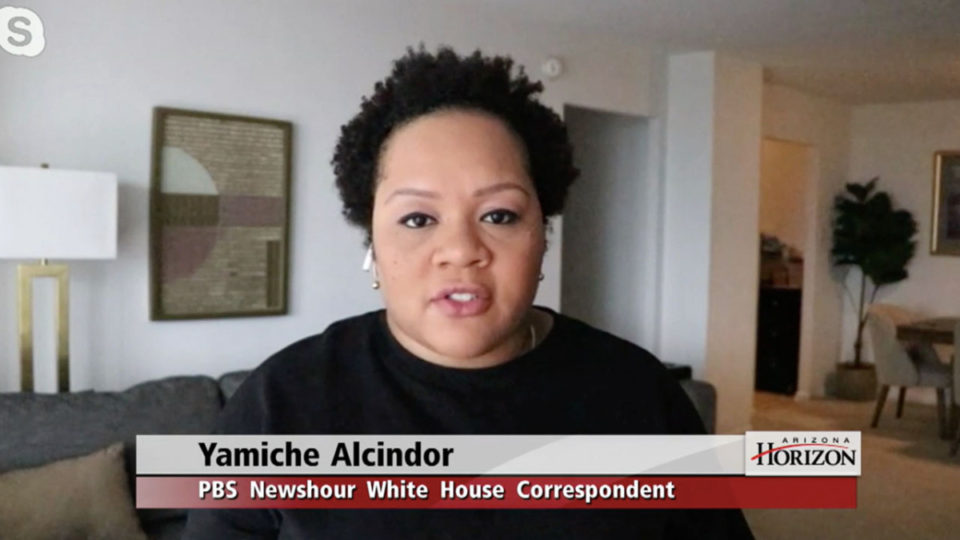‘Stay Focused. Remember Your Purpose’
Journal-isms Inc. Appoints Board of Directors
Karyn Collins Dies, Writer and Lover of Dance
Making Highest Ranks as White as Possible
Editing for Diversity Improves the Product
Foreigners Covering U.S. Vote See Sad Parallels
Short Takes
Support Journal-isms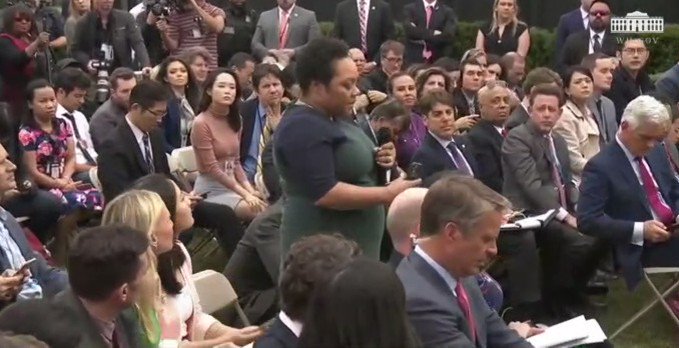
‘Stay Focused. Remember Your Purpose’
In a year in which she joined other women and people of color as the target of insults from the president of the United States, only to gain support from viewers and colleagues, Yamiche Alcindor was named Journalist of the Year Friday by the National Association of Black Journalists.
“I feel so honored to be the 2020 NABJ Journalist of the Year,” Alcindor, White House correspondent for the “PBS NewsHour” and contributor to NBC News and MSNBC, tweeted.
“So many journalists are doing amazing work amid this election, pandemic, and racial reckoning and I am blessed to be recognized among them.”
It was the latest in a series of accolades. In September, The International Women’s Media Foundation named Alcindor the recipient of the 2020 IWMF Gwen Ifill Award “for her coverage at the intersection of race and politics, and her career-long commitment to diversity in journalism.”
The website The Root chose her for its “Root 100,” outstanding African Americans ages ages 25 to 45, saying, “She generally wears blazers, not capes, but her 10-toes-down reporting from the White House’s front lines of delusion and lies has made Yamiche Alcindor this year’s journalism superhero. When Donald Trump ignored or interrupted her at multiple press briefings, calling her questions “nasty” and her “threatening,” the masterful PBS NewsHour correspondent persisted in fact-checking the president’s self-aggrandizing manipulations of the truth.”
In June, the Ballantine publishing house announced it would publish a memoir by Alcinor, who turns 34 on Sunday. Titled “Don’t Forget,” the book will show “how the precise path Alcindor took — as the child of Haitian immigrants and as a journalism prodigy covering Black Lives Matter and civil rights abuses — informs her point of view while reporting on one of the most chaotic administrations in modern times.”
In the most well-known encounter with Trump, in March Alcindor asked the president about his claim state authorities did not need as much medical equipment as they were requesting. Trump made the claim during an interview with Sean Hannity on Fox News, James Walker reported at the time for Newsweek.
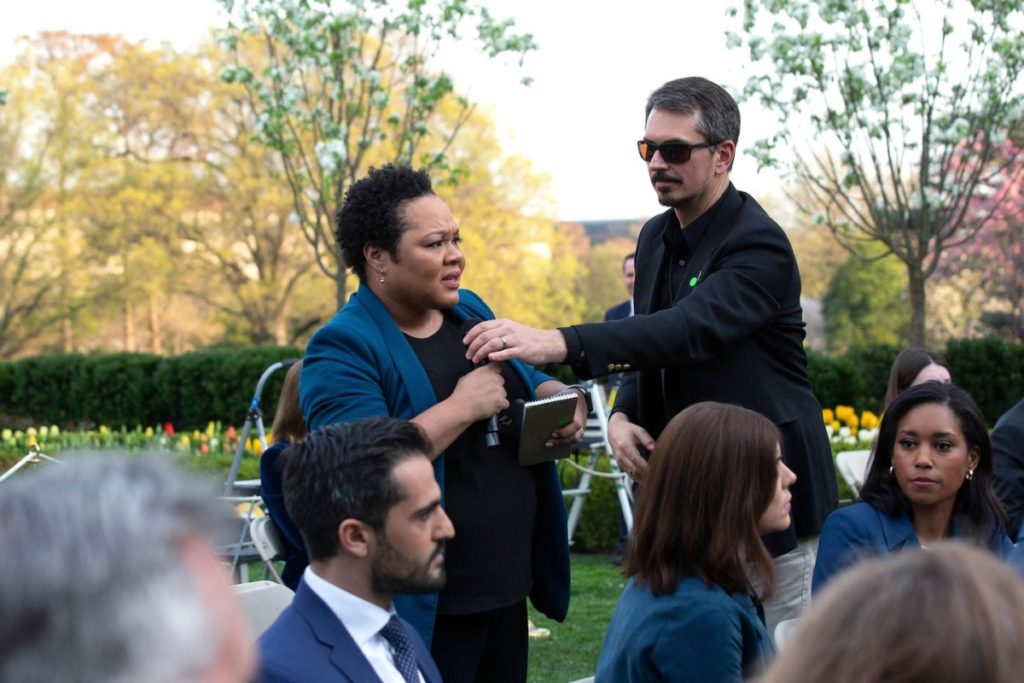
“Trump interrupted Alcindor and said she needed to be more ‘positive’ before adding: ‘It’s always trying to get you… and you know what, that’s why nobody trusts the media anymore’.
” ‘That’s why you used to work for the Times and now you work for somebody else,’ the president said. ‘Be nice. Don’t be threatening. Be nice.’
“Alcindor continued with her question, asking Trump how his view would impact [fulfillments] of medical equipment orders.
” ‘It’s not going to impact it,’ Trump responded. ‘We’re producing tremendous numbers of ventilators. We’re doing a great job on it.’
“He later added: ‘You, me, we’re all on the same team. When journalists get up and you’re a journalist, a fine journalist, and ask questions that are so threatening — we’re all on the same team.’
“When Alcindor tried to ask a follow-up question, a White House staffer took the microphone out of her hand as the president berated the correspondent for not being ‘fair’ to other journalists.”
“Posting on social media after the press briefing, Alcindor said: ‘President Trump today at the White House said to me: “Be nice. Don’t be threatening.”
” ‘I’m not the first human being, woman, black person or journalist to be told that while doing a job.
” ‘My take: Be steady. Stay focused. Remember your purpose. And, always press forward.’ . . .”
Alcindor was introduced as NABJ’s “Journalist of the Year” Friday on PBS’ “Washington Week.” As the show ended, the political journalists were asked what they would be looking for on Tuesday, Election Day. Her answer took a different tack.
“I think this is a race about . . . the empathy that people are feeling because this is a race that is really life and death,” Alcindor replied. “When I was talking to voters, it’s not about policy or political platforms. It’s about whether people feel that the people they’re supporting will help them strive and thrive in this. That’s different from past elections. So I’m going to be watching how people emotionally react to all that’s going on and how people tell people about how they voted and how they made their decisions based on their hearts and minds rather than on policy.”
NABJ announced Alcindor’s honor along with others to be bestowed in a virtual ceremony in December.
They include:
Hall of Fame Inductees:
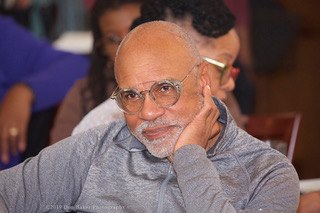 Fred Sweets (pictured, by Don Baker) contributing editor, St. Louis American, former photographer and editor; Pam Johnson, named in 1981 as publisher of Gannett’s Ithaca (N.Y.) Journal, becoming the first African American woman in the nation to head a general circulation newspaper; Pam Oliver, sportscaster; Mary Mitchell, Chicago Sun-Times columnist; John McCaa, retired anchor for WFAA-TV in Dallas; Cathy Hughes, media entrepreneur; Clarice Tinsley, longest-serving news anchor in the Dallas/Fort Worth television market.
Fred Sweets (pictured, by Don Baker) contributing editor, St. Louis American, former photographer and editor; Pam Johnson, named in 1981 as publisher of Gannett’s Ithaca (N.Y.) Journal, becoming the first African American woman in the nation to head a general circulation newspaper; Pam Oliver, sportscaster; Mary Mitchell, Chicago Sun-Times columnist; John McCaa, retired anchor for WFAA-TV in Dallas; Cathy Hughes, media entrepreneur; Clarice Tinsley, longest-serving news anchor in the Dallas/Fort Worth television market.
Special Honors Recipients:
 Michael J. Feeney Emerging Journalist of the Year: Rachel V. Scott (pictured), ABC News White House correspondent
Michael J. Feeney Emerging Journalist of the Year: Rachel V. Scott (pictured), ABC News White House correspondent
- Legacy Award: Rehema Ellis, NBC News correspondent
- Chuck Stone Lifetime Achievement Award: Kevin Merida, ESPN senior vice president and editor-in-chief, The Undefeated
- Journalist of Distinction: Elaine Houston, anchor at WNYT in Albany, N.Y.
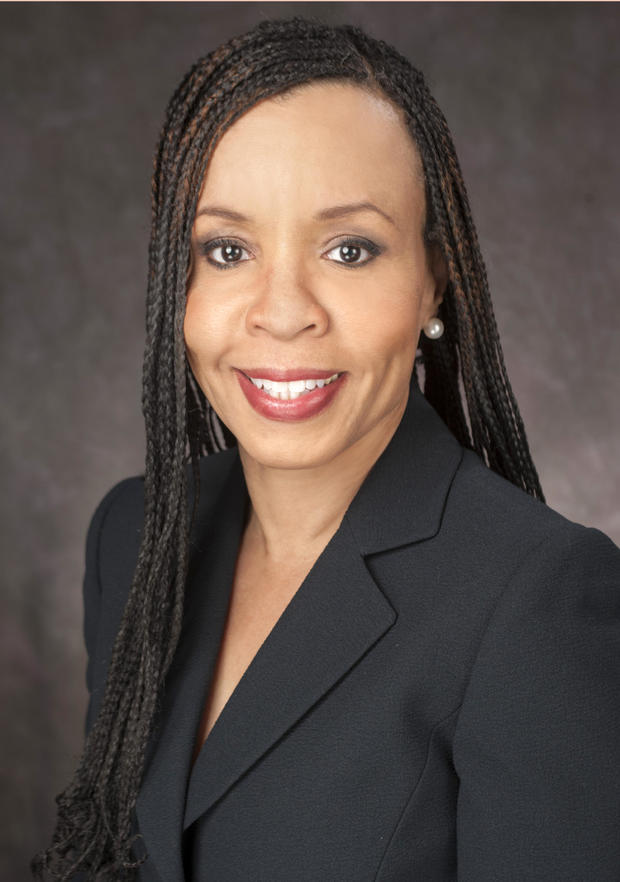 Ida B. Wells Award: Kimberly Godwin (pictured), executive vice president of News, CBS News
Ida B. Wells Award: Kimberly Godwin (pictured), executive vice president of News, CBS News
- Journalism Educators of the Year: Susan Mango Curtis of Northwestern University; and James McJunkins Sr. of Clark Atlanta University.
- Angelo B. Henderson Community Service Award: Chelle Luper Wilson, motivational speaker, entrepreneur and philanthropist
- Patricia L. Tobin Media Professional Award: Ramona Logan, founder of Image Advantage, public relations consultant
- Student Journalist of the Year: Arthur Cribbs, Howard University
- Best Practices Award: The Trace
- Percy Qoboza Foreign Journalist Award: Mahmoud Hussein of Egypt, imprisoned Al Jazeera journalist
No “Thumbs Down” award, given annually for reporting, commentary or other content found to be racially insensitive, or for practices at odds with the mission of NABJ, was reported.
- BOTWC (Because of Them We Can): 10 Reasons Why Journalist Yamiche Alcindor Is Pure Back Girl Magic (April 1)
- Stuart Emmrich, Vogue: President Trump Seems to Have a Problem With Yamiche Alcindor. I Wonder Why. (March 31)
- National Association of Black Journalists: NABJ Awards USA Today’s Yamiche Alcindor, Emerging Journalist of the Year (2013)
- Julian Wyllie, Current: With a focus on civil rights, Yamiche Alcindor rises to the top as a White House correspondent (Aug. 19)

Journal-isms Inc. Appoints Board of Directors
Thirteen advocates for diversity in the news business have accepted appointment to the inaugural board of directors of Journal-isms Inc., the nonprofit corporation that publishes the Richard Prince’s Journal-isms™ column and organizes the monthly Journal-isms Roundtable, the corporation announced on Saturday.
Journal-isms, a news site dedicated to diversity issues in the news media, began in print in 1991 and went online in 2002.
The Journal-isms Roundtable is a dinner group of more than 50 current and former journalists, authors and editors who meet every month to discuss issues of race, media and other current topics. Its discussions serve as background for journalists and are recorded and publicly posted.
The new board “is a foundation we can build on for the next 20 years,” said Neil Foote, a member of the inaugural board who has helped guide Journal-isms Inc. since it became a stand-alone operation in 2016. Foote is also a member of the Journal-isms Strategy Committee, which includes Earl Caldwell, Paul Delaney, Gladys Edmunds, Bill Elsen, Alison Bethel McKenzie, Ingrid Sturgis and Betty Anne Williams.
The inaugural board, expected to convene at the end of this year, includes:
- Lynne Adrine, director, D.C. Graduate Program, Broadcast and Digital Journalism, Syracuse University
- Caesar Andrews, professor and Leonard distinguished chair in media ethics and writing, Reynolds School of Journalism, University of Nevada
- Julie Burton, president, Women’s Media Center
- Keith Clinkscales, media executive and entrepreneur; founder and CEO of The Shadow League
- David Honig, president emeritus and founder, Multicultural Media, Telecom & Internet Council; chief counsel of the Florida NAACP.
- Bill Mitchell, CEO and publisher, National Catholic Reporter
- Gene Policinski, president and COO of the Freedom Forum Institute and senior fellow for its First Amendment Center
- Susan Smith Richardson, CEO, Center for Public Integrity
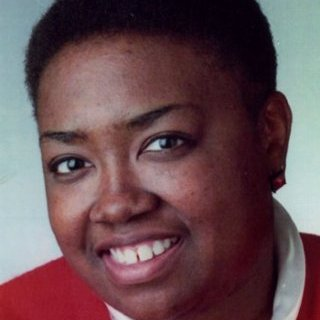
Karyn Collins Dies, Writer and Lover of Dance
Karyn D. Collins, a freelance writer and adjunct professor who was founding chair of the Arts & Entertainment Task Force of the National Association of Black Journalists, died of breast cancer Wednesday. She was 56 and in home hospice in Bloomfield, N.J., her brother, Don Collins, told Journal-isms.
In a note to the news staff, Editor Paul D’Ambrosio of the Asbury Park Press in New Jersey called Collins a “former Press features writer, dance enthusiast, teacher, mentor and friend.” Collins worked at the Press from 1989 to 2009.
“Karyn’s brother, Don, and her friends want to honor Karyn by setting up a scholarship fund at a dance center where she taught for 31 years,” D’Ambrosio added.
Collins was also part of NABJ lore, having prompted a walkout by women at the 1992 convention in Houston. At the opening session on hip-hop culture, the late Geto Boys rapper Bushwick Bill referred to women as “bitches” and “ho’s.”
According to her colleague Patrick Riley, Collins recalled, “Twenty years ago I got cursed out by Bushwick Bill at the NABJ opening plenary. That sparked a walkout by other members. By the time I got back to my hotel room I had a msg from my editor Jill Williams wanting to know what I had done. The story was on the AP wire. By the end of that week with the help of Patrick Riley Greg Dunmore and Victoria Chapman we had started the NABJ Arts and Entertainment Task Force. How ya like us now? Big props to the new team led by Kelley Carter Nekesa Moody and Adrienne Samuels!!!”
Carter, current chair of the Arts & Entertainment Task Force, messaged Facebook friends, “Karyn was very special to the NABJ family for a number of reasons: she was the founding chair of NABJ’s A&E Task Force and even long after her tenure was over, she still was the FIRST person to volunteer and assist with any and all of the programming that our task force produced. She was invaluable and years ago in Detroit, saw a need for such a task force and because of that, she truly has helped a generation of A&E journalists, critics and features reporter get a leg up in this industry. . . .”
Collins maintained a website with some of her work. She wrote, “When you read a story by Karyn D. Collins you get journalism not only about Style in some cases, but written with style, with voice, with empathy.
“The stories you’ll find here represent a sampling of the work I’ve produced in recent years — features, profiles, fashion coverage including layouts in which I served as Style Editor, arts and entertainment stories, and dance reviews.
“But my career, which began in 1984, also has included stints covering municipal beats and education.
“That range of experience reflects my background as well as my willingness over the years to tackle new and unfamiliar territory.
“I grew up on the South Side of Chicago, the child of two educators and the granddaughter of journalist Enoch Waters, executive editor of the Chicago Defender.
“For many years, I dreamed of being a dancer before shifting my focus towards writing about dance and the arts.
“Since then I have broadened my focus to encompass a range of issues and topics. . . . “
The memorial service is to be held Monday and will be private due to the COVID-19 pandemic, friends said. The wake begins at 10 a.m. Eastern, the service at 11.
Friends may attend virtually at the following links:
https://www.inspiredfamilyministries.org/livestream.aspx…
https://www.youtube.com/mbcnewarknj?mc_cid=eec748b5e5…
https://www.facebook.com/mbcnewarknj?mc_cid=eec748b5e5…
In lieu of flowers the family requests that contributions be made to NJF (Memo line: Karyn Collins Scholarship Fund to:
NJ Foundation for Dance and Theatre Arts
Karyn Collins Scholarship Fund
527 Ringwood Ave.
Wanaque, NJ 07465
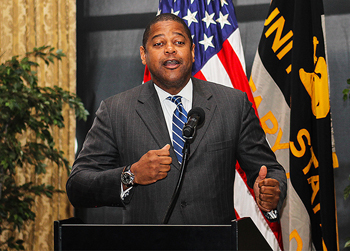
Making Highest Ranks as White as Possible
“Warren S. Whitlock enjoyed a remarkable career as a diversity officer at the federal Transportation Department, winning victories for poor communities of color that his superiors thought impossible,” Alicia Mundy wrote Oct. 23 for DC Report, founded and edited by Pulitzer Prize-winning journalist David Cay Johnston.
“There’s even a documentary film about his success in getting municipal bus service for a Black neighborhood in Beavercreek, Ohio, that had been bypassed intentionally.
“In its waning days of the Obama era, the Army chose Whitlock to become one of its highest-ranking Black civilians. His task: resolve diversity issues that had languished for years, some since George Herbert Walker Bush was commander-in-chief nearly three decades ago.
“After Trump became president, Whitlock encountered a very different situation. He found himself reporting to Diane Randon, a white woman who defended in writing keeping the names of Civil War traitors on streets at a U.S. Army base in Brooklyn. According to Randon’s Linkedin profile, she is the Army’s assistant deputy chief of staff, G2 (military intelligence).
“Behind Whitlock’s back, testimony later revealed, she denigrated him. Twice the boss ordered unauthorized investigations of Whitlock. In private, it was learned later, she maneuvered to get rid of Whitlock[,] whose title was “Deputy Assistant Secretary of the Army for Diversity and Leadership.”
“A Whitlock subordinate who has long been friendly with his boss called him vile names behind his back, testimony would later reveal.
“Whitlock, a Princeton graduate with a master’s degree from Columbia, had a strong performance record.
“The Army abruptly fired Whitlock in January 2019, even though he had a pending racial discrimination complaint which is supposed to prevent retaliatory actions by our government. The way Whitlock was fired denied him an opportunity to correct an administrative mistake he made. The firing order also left Whitlock without his pension or health insurance.
“Whitlock’s dismissal, reported here for the first time, could be seen as just one unfortunate example of mistreatment of an employee. But a DC Report investigation shows it is much more. It is a case with broad implications for our entire federal workforce. It reveals the effects of the Trump administration’s efforts to make the highest civilian ranks of our government as white as possible.”
- Jena McGregor and Eli Rosenberg, Washington Post: Trump’s crackdown on training about white privilege draws broad opposition
- Alicia Mundy, DC Report: Out On The Street After Two Secret And Illegal Investigations. Part Two: How White Trump Appointees Targeted a Top Civilian in the Pentagon, Undercut Him, Shunted Him Off to a Do-Nothing Job and Then Fired Him (Oct. 24)
- Terry H. Schwadron, DC Report: Racism In The Pentagon And Higher
Editing for Diversity Improves the Product
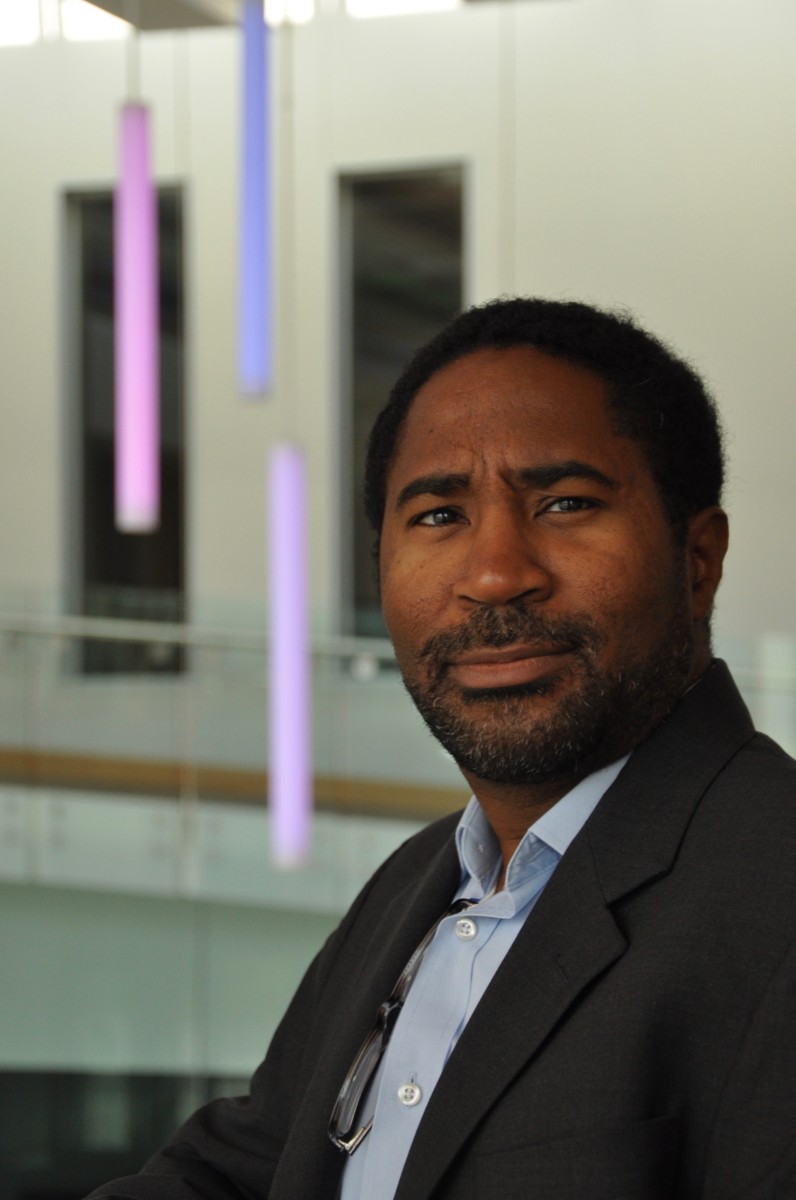 “In June, the ACES Twitter chat featured Steve Bien-Aimé (pictured) an assistant professor at Northern Kentucky University who researches race and gender issues in media and a member of the advisory council of Conscious Style Guide,” Bien-Aimé wrote Oct. 19 for ACES: The Society for Editing. “Steve spoke about the editor’s role in ensuring that diverse perspectives are represented. View the full recap on Wakelet.
“In June, the ACES Twitter chat featured Steve Bien-Aimé (pictured) an assistant professor at Northern Kentucky University who researches race and gender issues in media and a member of the advisory council of Conscious Style Guide,” Bien-Aimé wrote Oct. 19 for ACES: The Society for Editing. “Steve spoke about the editor’s role in ensuring that diverse perspectives are represented. View the full recap on Wakelet.
“Diversity and inclusion mean representing a lot of voices in your editing. The more robust the editing process, the more authentic you’ll make the final product.
“ACES: What advice do you have for editors when discussing diversity and inclusion with an author?
“Steve Bien-Aimé (@Steve_BienAime): Tone is everything. Authors have visions for their work, and our job is to facilitate that. In terms of being inclusive, telling an author that their work marginalizes certain groups might be an illuminating conversation or the conversation could become hostile. Perhaps explaining that a specific character or passage will distract or anger a large portion of the audience could be more productive. Anything that can be perceived as bigoted doesn’t help the overall product, and the lasting memory is the hurtful passage.
“Katharine O’Moore-Klopf (@KOKEdit): I like to tell authors that inclusive language reaches the largest number of readers without making anyone feel left out.
“Laura M. Browning (@ellembee): I also like to point out what the cost is to the writer. . . .”
(Credit: The New Yorker)
Foreigners Covering U.S. Vote See Sad Parallels
“With the election approaching, America is a prime global news story, and foreign correspondents are playing a crucial role translating the febrile atmosphere for readers and viewers back home, “Jon Allsop wrote Friday for Columbia Journalism Review. “(Donald Trump has fans abroad, of course, but most international observers seem to want him gone: only around fifteen percent of respondents to a recent poll covering seven European countries hope that he’s reelected.) . . .
“This week, the New Yorker released a documentary about how foreign correspondents view the United States. Larry Madowo, a Kenyan journalist who works for the BBC, said that he’s been stunned to see that ‘the same things that America has been lecturing Africa on appear to be happening right here at home.’ “
Madowo also said, “There are so many parallels between the U.S. election and elections I have covered in Africa. There is talk of rigging, which is not a word I ever thought I would hear associated with an American election.
“I’m working on a story on voter suppression in Georgia, which appears to be a systematic approach to make sure that underprivileged, many of them people of color, Black people, don’t get a chance to vote. This is something that dictatorial regimes do in other countries. They deliberately make sure that those who are not likely to vote for them, don’t get a chance to vote. And here it is, I’m working on it here in the U.S.”
Sonia Dridi, from France, said, “When I arrived here in the U.S., I arrived from Egypt, and very quickly I started going all over the country.to different meetings, and I will see how people started insulting media, and this is all thing I saw in Egypt and especially in the last few years when it’s back to dictator in Egypt.”
Allsop also wrote, some of the journalists interviewed by the New Yorker” feel that not being from the US is an advantage in their reporting, and affords them a measure of protection: they are, after all, not part of the ‘fake’ domestic news media that Trump has encouraged many Americans to hate. But rubber bullets don’t discriminate — and American immigration officials do. Last month, the Department of Homeland Security outlined proposals for reforming the visa that foreign correspondents typically use to work in the US.
“As of now, the visa is valid for five years, but officials want to cut that period to two-hundred-and-forty days, with a maximum extension of the same length of time. (DHS is similarly proposing to tighten the conditions of certain student and exchange visas.) The change would, ostensibly, ‘reduce fraud and ensure national security,’ but it’s more likely a pretext to crack down on journalism. Recently, news organizations including Reuters, Agence France-Presse, and the Canadian Broadcasting Corporation pushed back on the proposal in a joint statement. . . .”
- Luis Alonso Lugo, Univision: What do Donald Trump and Hugo Chavez have in common?
- Yasmine Al-Sayyad, New Yorker: What Foreign Journalists See in the U.S. Election
- Mary C. Curtis, Nieman Reports: It’s Time to Cover Black Women as the Norm and Not the “Other”
- William Howell and Terry Moe, C-SPAN: “Presidents, Populism, & the Crisis of Democracy” (video) (Sept. 17)
- John Templon, BuzzFeed: Voters Of Color Have Less Power In The Electoral College Than White Voters
Short Takes
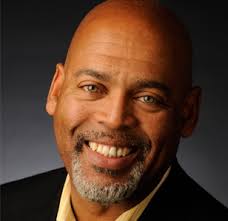 “Hub Brown (pictured), associate dean and associate professor at the Newhouse School of Public Communications at Syracuse University, has been named dean of the University of Florida College of Journalism and Communications,” UF Provost Joe Glover announced Friday.
“Hub Brown (pictured), associate dean and associate professor at the Newhouse School of Public Communications at Syracuse University, has been named dean of the University of Florida College of Journalism and Communications,” UF Provost Joe Glover announced Friday.
- “Byron Allen‘s Allen Media Group has purchased two over-the-air broadcast TV networks, This TV and Light TV, in an acquisition from MGM,“, Gerren Keith Gaynor reported Wednesday for The Grio “The networks broadcast 24 hours a day and are available via over-the-air, cable and online for free nationwide. Both This TV and Light TV program a variety of MGM’s film and television content.”
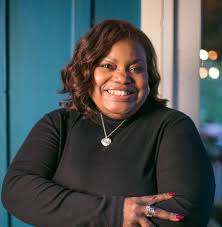 “The Board of Directors of LION Publishers has new leadership,” Lion Publishers reported. The Board approved the transition at its annual meeting Thursday, Oct. 22, approving Jay Allred as Chair of the Board and electing Tracie Powell (pictured) as Vice Chair. . . . Powell is a former journalist and independent publisher who is now a program officer at Borealis Philanthropy, which works on racial justice in media. She said, “I remember my first LION Conference. I thought to myself, ‘finally, these are my people.’ Back then it was hard to find other publishers who were doing what I was doing, launching my own independent news organization. Now, I’m helping to lead that organization as vice chair. What an incredibly humbling experience this is,” Powell said. “And I couldn’t be more honored than to serve alongside one of the best partners one could ask for, Jay Allred.”
“The Board of Directors of LION Publishers has new leadership,” Lion Publishers reported. The Board approved the transition at its annual meeting Thursday, Oct. 22, approving Jay Allred as Chair of the Board and electing Tracie Powell (pictured) as Vice Chair. . . . Powell is a former journalist and independent publisher who is now a program officer at Borealis Philanthropy, which works on racial justice in media. She said, “I remember my first LION Conference. I thought to myself, ‘finally, these are my people.’ Back then it was hard to find other publishers who were doing what I was doing, launching my own independent news organization. Now, I’m helping to lead that organization as vice chair. What an incredibly humbling experience this is,” Powell said. “And I couldn’t be more honored than to serve alongside one of the best partners one could ask for, Jay Allred.”
To subscribe at no cost, please send an email to journal-isms-subscribe@yahoogroups.com and say who you are.
Facebook users: “Like” “Richard Prince’s Journal-isms” on Facebook.
Follow Richard Prince on Twitter @princeeditor
Richard Prince’s Journal-isms originates from Washington. It began in print before most of us knew what the internet was, and it would like to be referred to as a “column.” Any views expressed in the column are those of the person or organization quoted and not those of any other entity. Send tips, comments and concerns to Richard Prince at journal-isms-owner@yahoogroups.com
View previous columns (after Feb. 13, 2016).
- Diversity’s Greatest Hits, 2018 (Jan. 4, 2019)
- Book Notes: Is Taking a Knee Really All That? (Dec. 20, 2018)
- Book Notes: Challenging ’45’ and Proudly Telling the Story (Dec. 18, 2018)
- Book Notes: Get Down With the Legends! (Dec. 11, 2018)
- Journalist Richard Prince w/Joe Madison (Sirius XM, April 18, 2018) (podcast)
- Richard Prince (journalist) (Wikipedia entry)
- February 2018 Podcast: Richard “Dick” Prince on the need for newsroom diversity (Gabriel Greschler, Student Press Law Center, Feb. 26, 2018)
- Diversity’s Greatest Hits, 2017 — Where Will They Take Us in the Year Ahead?
- Book Notes: Best Sellers, Uncovered Treasures, Overlooked History (Dec. 19, 2017)
- An advocate for diversity in the media is still pressing for representation, (Courtland Milloy, Washington Post, Nov. 28, 2017)
- Morgan Global Journalism Review: Journal-isms Journeys On (Aug. 31, 2017)
- Diversity’s Greatest Hits, 2016
- Book Notes: 16 Writers Dish About ‘Chelle,’ the First Lady
- Book Notes: From Coretta to Barack, and in Search of the Godfather
- Journal-isms’ Richard Prince Wants Your Ideas (FishbowlDC, Feb. 26, 2016)
- “JOURNAL-ISMS” IS LATEST TO BEAR BRUNT OF INDUSTRY’S ECONOMIC WOES (Feb. 19, 2016)
- Richard Prince with Charlayne Hunter-Gault,“PBS NewsHour,” “What stagnant diversity means for America’s newsrooms” (Dec. 15, 2015)
- Book Notes: Journalists Follow Their Passions
- Book Notes: Journalists Who Rocked Their World
- Book Notes: Hands Up! Read This!
- Book Notes: New Cosby Bio Looks Like a Best-Seller
- Journo-diversity advocate turns attention to Ezra Klein project (Erik Wemple, Washington Post, March 5, 2014)
.

